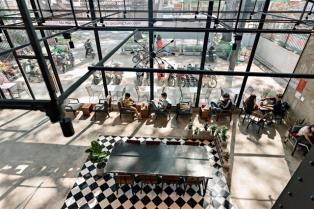Many analysts think now is a good time for investors looking for acquisitions in the property industry to act since difficulties caused by the Covide-19 pandemic have thrown up opportunities.

Many analysts think now is a good time for investors looking for acquisitions in the property industry to act since difficulties caused by the Covide-19 pandemic have thrown up opportunities.
The pandemic has weighed heavily on a number of sectors, and property is no exception, with the market seeing a significant fall in transactions in the first half of the year.
The Viet Nam Association of Realtors said supply too had been at a four-year low, with no new projects being in the pipeline either.
The frozen market has pushed many property businesses into insolvency.
They include the Tai Nguyen Trading Manufacturing Construction Ltd. Company, which owes a debt of over VND4 trillion (US$176.5 million) to the Bank of Investment and Development of Viet Nam (BIDV).
The bank is looking to sell the company’s ambitious Kenton Node project in HCMC’s Nha Be District, which is also partly mortgaged to NSB and PVCombank.
However, many other businesses are ready to inject large sums of money to enhance their land holdings for developing more projects in future.
An Gia Real Estate Investment and Development Joint Stock Company (AGG) has announced plans to invest VN 3-5 trillion in lands and new projects.
Last year it had spent VND2.8 trillion to buy lands in Binh Duong, Vung Tau and HCM City.
According to data from SohoVietnam, investors’ demand for hotels has increased in recent times.
Some VND8-10 trillion is awaiting investment, with SohoVietnam experts saying priority would be given to projects having 100-500 rooms in HCMC, Ha Noi, Da Nang, Nha Trang, Phu Quoc, Hoi An, Ha Long, Hue, Quy Nhon, and Vung Tau.
A Savills Viet Nam report on the real estate market in the first quarter said investors with deep pockets are ready to participate in M & A deals.
Projects under negotiation since 2019 have a combined value of over US$500 million.
A Savills expert said many deals were expected to be completed soon thanks to the Government’s determination to support enterprises with incentives.
They include tax breaks, tax payment deadline extensions and reduction in land rent for businesses affected by the pandemic, rescheduling of bank loans, interest cuts and waivers, and fee reduction.
A credit package of VND250 trillion (US$10.6 billion) has also been earmarked to meet businesses’ funding needs.
The Government has asked related agencies to review and cut administrative procedures and speed up disbursement of the money.
All this points to an increase in M&A in the property market in the near future.
Money flowing into speculative asset classes
According to data from the Viet Nam Securities Depository, the number of new accounts opened with brokerages in June reached a record 35,046, most of them individual accounts.
Money from these new investors has helped the stock market recover rapidly after the nasty shock caused by the Covid-19 crisis.
Phan Dung Khanh, investment director of Maybank KimEng Securities, told Dau Tu newspaper that some investors withdrew their money from banks or even sold properties to invest in the stock market.
Market observers said the low deposit interest rates at banks encouraged people to withdraw their savings and put the money in riskier asset classes like gold and securities.
According to SSI Securities Corporation, since July 1 banks have cut their deposit interest rates by 10-90 basis points.
Leading the way have been the four State-owned banks with a reduction of 25-30 basis points for deposits of up to six months and 50 points for terms of six months or more.
The interest rate cuts began at the end of 2019, and have been occurring intermittently.
Now depositors get 3.5-4.25 per cent for terms of up to six months, 4.4-6.7 per cent for terms of six-12 months and 5.5-7.5 per cent for terms of 12-13 months.
A lot of the money pulled out of banks has gone into gold, whose prices have been soaring and reached an all-time high of VND50.32 million per tael (1.2 ounces) in the second week of July.
Global prices of the yellow metal have been rising as people looked for a safe haven amid the Covid-19 pandemic rocking the world.
In July 23 the Saigon Gold and Jewelry Company listed a tael of SJC gold at VND53.5 million – VND54.85 million (buying – selling), the highest prices ever.
Many people also hunted for stocks beaten down during the pandemic hoping to make a killing when the market recovered once the outbreak was contained.
A report of Ha Noi Stock Exchange (HNX) said that by June 30, 357 enterprises had their shares with total value of VND137 trillion being listed on the HNX, which had market capitalization of VND 203 trillion, up by 6.2 per cent compared with the figure recorded at the beginning of the year.
The average transaction value was VND547 billion per session, a 33 per cent increase compared to a year earlier.
On the UPCoM, it was VND312 billion, a 5.7 per cent rise.
The question arises if investors should consider risky asset classes.
Analysts said gold would not be a wise option now, especially for swing traders, since prices had already been running up for a long time.
In reality, cash flows around the world were being split rather strongly, not only being injected into gold but also into various other investment channels because many countries were applying several measures to support their economies, they said.
They also warned that prices would likely see a sharp drop once a vaccine is developed for Covid-19.
So how about investment in securities?
Experts said most new investors in the stock market had lost money due to their lack of experience.
Other asset classes like property and bonds too would not offer great returns now.
The former had admittedly overcome an extremely difficult period, but did not promise assured returns unlike in the past, they said.
Investment in corporate bonds, many of which offered high interest rates, boomed for a certain period but had cooled down since the Ministry of Finance warned investors of the risk of losing their money if issuers face difficulties.
Khanh of Maybank KimEng Securities said investors in any speculative asset class should be cautious.
Though the economy is not doing well the stock market is booming thanks to speculative flows, according to Khanh.
A similar situation is seen in many countries around the world and not only in Viet Nam, but it is unsustainable. —VNS





